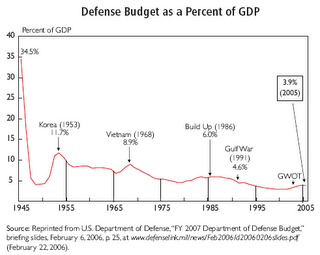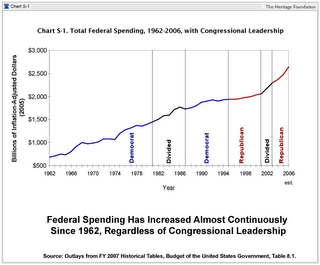Green Energy
Not as much as most of us think it is:
... an analysis that shows military spending as a historically low percentage of GDP, demonstrating how entitlements have outpaced defense allocations from the Lyndon Johnson era to the present.
I recently had the pleasure of spending a bit of time around a few hundred young liberal activists. One refrain I heard over and over again was that the military-industrial complex in the United States was growing larger than it has ever been, taking into account the entire course of American history. Creeping toward totalitarian fascism, we apparently are.
Well, not quite. In fact, military spending is as high as it has ever been. But the American economy is also as high as it has ever been. As a percentage of the American economy, military spending today is not particularly outrageous[.]
He then displays this chart, which shows military defense spending at 3.9% of GDP in 2005 (Click on chart to enlarge):

There's one thing missing from this analysis: the 3.9% figure is based on the Defense Department's officially recognized defense spending for FY 2005, about $420.7 billion. This budget leaves out the spending for the wars in Iraq and Afghanistan, which have fallen under a series of supplemental funding bills (pdf) that totalled $420 billion between September 2001 and June 2006. Assuming this amount was instead budgeted by fiscal year in an even distribution, the real total would include another 88.4 billion in 2005, bringing actual defense spending to $509.1 billion, or 4.7% of GDP, not 3.9%.
This quibble aside, Franklin's overall argument stays strong, as total defense spending of 4.7% of GDP remains below spending for all major wars from WWII forward, on par with allocations around the first Gulf War and below expenditures during Ronald Reagan's peacetime military build-up. Strictly as a historical proportion of the US Economy, the GWoT (including Iraq) would appear to be economically sustainable, this sustainability hinging upon growth in other aspects of the budget, including entitlements.
So, that chart shows the military budget compared to the Gross Domestic Product. Now, let's look at a chart that shows the total U.S. Government Budget (Click on chart to enlarge):

Clearly, the military budget and the extra expenditures for the war are not costing us as much as we think they are.
As I recall the military budget was 30-40% of the total budget during the Reagan years. I think it may have even gone higher.
So, the point is, this war is not bankrupting us. However, that is not the same thing as saying that we are getting what we're paying for.
That part, I'm not so sure about. I think I need to study the makeup of the Iraqi Parliament.
- Putin: Economically Strapped Dictator Threatens To Play The Nuclear War Card
From Al Fin: Is global thermonuclear war unthinkable? Not in Moscow. As Russia’s economy takes a deep dive into a shallow pool, the Kremlin’s war planners are busy laying the groundwork for large scale global violence.Under mounting Western...
-
Lois Lerner Mistakenly Received an Email to Senator Chuck Grassley Inviting Him to Speak at an Event. She Immediately Asked If She Should Refer Him For an Audit Yes, you read it right. Click on the title and read the whole thing. BY THE WAY, at this...
- The Mother Jones (3 Sd To The Left Of The Nation) View Of This Mess
Kevin Drum:As several people have pointed out to me, my headline this morning ("The Republican Defeat in the Budget Deal Was Complete and Total") is satisfying but not entirely true. After all, Republicans did get a continuing resolution...
- Right On Schedule
Human Events: Obama wants short-term fix on sequester President Barack Obama called on Congress to agree to temporary spending cuts to avoid sequestration Tuesday, agreeing that “the full budget may not be finished before March 1.” But much...
-
There is no way ANYONE can spin this as being actually a good thing by looking at the big picture. Like the Repub idiot on Fox right now saying Boehner has reversed the spending ship in the long run. America does not have time to wait for the long run...
Green Energy
How Much Money Is This War Costing Us?
Not as much as most of us think it is:
... an analysis that shows military spending as a historically low percentage of GDP, demonstrating how entitlements have outpaced defense allocations from the Lyndon Johnson era to the present.
I recently had the pleasure of spending a bit of time around a few hundred young liberal activists. One refrain I heard over and over again was that the military-industrial complex in the United States was growing larger than it has ever been, taking into account the entire course of American history. Creeping toward totalitarian fascism, we apparently are.
Well, not quite. In fact, military spending is as high as it has ever been. But the American economy is also as high as it has ever been. As a percentage of the American economy, military spending today is not particularly outrageous[.]
He then displays this chart, which shows military defense spending at 3.9% of GDP in 2005 (Click on chart to enlarge):

There's one thing missing from this analysis: the 3.9% figure is based on the Defense Department's officially recognized defense spending for FY 2005, about $420.7 billion. This budget leaves out the spending for the wars in Iraq and Afghanistan, which have fallen under a series of supplemental funding bills (pdf) that totalled $420 billion between September 2001 and June 2006. Assuming this amount was instead budgeted by fiscal year in an even distribution, the real total would include another 88.4 billion in 2005, bringing actual defense spending to $509.1 billion, or 4.7% of GDP, not 3.9%.
This quibble aside, Franklin's overall argument stays strong, as total defense spending of 4.7% of GDP remains below spending for all major wars from WWII forward, on par with allocations around the first Gulf War and below expenditures during Ronald Reagan's peacetime military build-up. Strictly as a historical proportion of the US Economy, the GWoT (including Iraq) would appear to be economically sustainable, this sustainability hinging upon growth in other aspects of the budget, including entitlements.
So, that chart shows the military budget compared to the Gross Domestic Product. Now, let's look at a chart that shows the total U.S. Government Budget (Click on chart to enlarge):

Clearly, the military budget and the extra expenditures for the war are not costing us as much as we think they are.
As I recall the military budget was 30-40% of the total budget during the Reagan years. I think it may have even gone higher.
So, the point is, this war is not bankrupting us. However, that is not the same thing as saying that we are getting what we're paying for.
That part, I'm not so sure about. I think I need to study the makeup of the Iraqi Parliament.
- Putin: Economically Strapped Dictator Threatens To Play The Nuclear War Card
From Al Fin: Is global thermonuclear war unthinkable? Not in Moscow. As Russia’s economy takes a deep dive into a shallow pool, the Kremlin’s war planners are busy laying the groundwork for large scale global violence.Under mounting Western...
-
Lois Lerner Mistakenly Received an Email to Senator Chuck Grassley Inviting Him to Speak at an Event. She Immediately Asked If She Should Refer Him For an Audit Yes, you read it right. Click on the title and read the whole thing. BY THE WAY, at this...
- The Mother Jones (3 Sd To The Left Of The Nation) View Of This Mess
Kevin Drum:As several people have pointed out to me, my headline this morning ("The Republican Defeat in the Budget Deal Was Complete and Total") is satisfying but not entirely true. After all, Republicans did get a continuing resolution...
- Right On Schedule
Human Events: Obama wants short-term fix on sequester President Barack Obama called on Congress to agree to temporary spending cuts to avoid sequestration Tuesday, agreeing that “the full budget may not be finished before March 1.” But much...
-
There is no way ANYONE can spin this as being actually a good thing by looking at the big picture. Like the Repub idiot on Fox right now saying Boehner has reversed the spending ship in the long run. America does not have time to wait for the long run...
